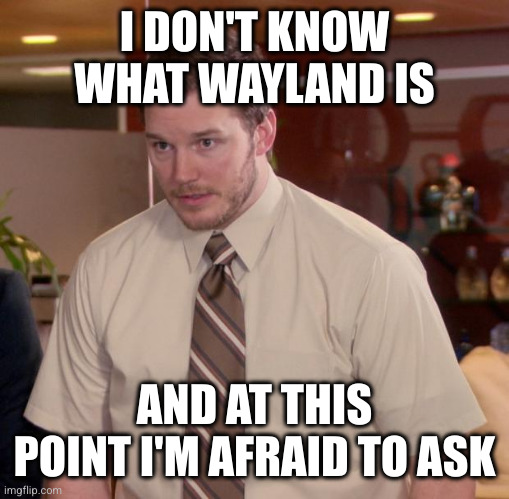this post was submitted on 29 Apr 2024
476 points (96.5% liked)
linuxmemes
20880 readers
3 users here now
I use Arch btw
Sister communities:
- LemmyMemes: Memes
- LemmyShitpost: Anything and everything goes.
- RISA: Star Trek memes and shitposts
Community rules
- Follow the site-wide rules and code of conduct
- Be civil
- Post Linux-related content
- No recent reposts
Please report posts and comments that break these rules!
founded 1 year ago
MODERATORS
you are viewing a single comment's thread
view the rest of the comments
view the rest of the comments

Programs running graphically (Firefox, your file browser, etc.) need a way to tell the system "draw these pixels here". That's what the display server does; it takes all these applications, works out where their windows are and manages that pixel data.
XOrg has historically been the display server in common use, but it's very old and very cobbled together. It generally struggles with "modern" things that must people expect today. Multimonitor setups, vsync, hdr and all that. They work, but support is hacked together and brittle.
Wayland is a replacement for XOrg that was designed from scratch to fix a lot of these issues. But it's been an uphill battle because XOrg is the final boss of legacy codebases.
tl;dr They're both software that manages drawing pixels from applications to the display.
It seems an opportunity to ask my stupid questions.
Q1. If I am going to build my minimum linux installation without a GUI, does this require a display manager?
Q2. is there other way to interact with my machine other than tty
Q1: No, it does not require X. But some software even if not graphical, requires X libs for whatever reason (e.g. Using Qt)
Edit: to answer Q2: I don't think there is technically a way to interact with the system without a TTY but thats technicalities. Your more practical answer is to use SSH to log in and interact. This is how most IoT things work which run Linux and have no display capability at all.
thanks, but is there way to address some limitation (e.g. only one came to my mind scroll back.)
Use
screen?Maybe I don't understand what you're after. But 99.9% of Linux systems don't use X. But none of those are desktop PC's.
https://wiki.archlinux.org/title/Fbterm can take care of some of the limitations (use TTF fonts, for example) but support in general for nongraphical environments on Linux at the moment is not amazing
tmuxis your friend.Thanks for the advice